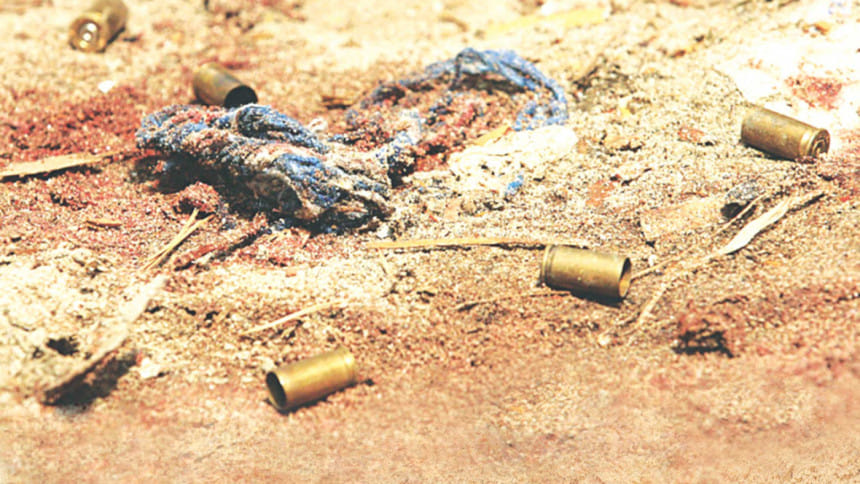How to read the Sinha murder verdict

For the government, the timing of the Sinha murder verdict on January 31 couldn't have been worse, with increasing global scrutiny following a US sanction on RAB over allegations of human rights violations, including extrajudicial killings. Yet, soon after the verdict, which handed death sentence to two police officers, a top leader of the ruling Awami League said, "It proves that the Sheikh Hasina government believes in the rule of law." He said so despite the verdict having blown up the entire story arc built by state officials around instances of extrajudicial killing, or any mislabelling thereof (shootout, crossfire, gunfire).
That's politics 101—you control the narrative regardless of what happens. You stick to it until it becomes the "truth", and you use that "truth" as a crutch in the face of any future allegation. So, before the Sinha verdict too gets sucked into this political vortex, it's important that we take control of the narrative and critically examine why this verdict is significant, but also why its place in history may not be as assured as many think.
What's in the verdict? Besides sentencing Teknaf's suspended OC Pradeep Kumar Das and inspector Liaqat Ali to death for the "pure and simple murder" of Sinha Rashed Khan, the court also sentenced six others—including three cops—to life while acquitting seven other police personnel. To be honest, capital punishment is not something we can ethically stand behind. But at least now, we have the comfort of knowing these people are being held to account for a murder planned in cold blood.
The verdict also marks a couple of firsts: it is the first time any law enforcement officers in the country have been brought to book for staging a shootout. It is also the first judicial acknowledgment of how a shootout/crossfire story is cooked up. Through its minute-by-minute description of the July 31, 2020 event, the court has essentially taken the lid off all the variations of this story produced over the years. In short, what all of them have in common is how the law enforcers encounter a "threat" from a "criminal" or his associates, and how they are "forced" to respond (read: fatally shoot) in self-defence. By exposing this farce, the verdict has shown that all shootout/crossfire incidents are basically premeditated.
However, being a first may be a source of comfort, but not necessarily a badge of honour. Pradeep and Co. did something horrible for which, we hope, they will pay soon enough. But Pradeep's record shows he had done that to many other people too. He has killed 204 people in crossfires, according to an investigation report cited by the prosecution. In a video clip, Pradeep was apparently seen advocating killing suspected drug traders during a public meeting. Could Sinha's murder, or that of all other victims, be avoided if he had been stopped sooner? Should we be happy that Sinha got justice, or sad that others before him did not?
This is not merely a rhetorical question. Sinha's murder may have been "pure and simple", but for a broader context, we need to de-simplify the circumstances under which the case progressed, gaining unprecedented momentum along the way. One may recall the muted standoff between the police and military establishments after the retired major's murder, and their shared determination to get to the bottom of it. What chance does a victim without such powerful backing have of getting justice in a similarly speedy manner?
Unfortunately, a crossfire victim's family can rarely file a case, according to Nur Khan Liton, secretary general of Ain o Salish Kendra. Police do not want to record such cases. Even when they do, it is hastily binned or somehow falls through midway, which explains why there's been a zero conviction rate until now. For example, Sinha's may have been the first case to get a guilty verdict but it wasn't the first to go on trial. In that first trial in 2010, the lower court in Kushtia ruled in favour of the cops, even though the victim's family insisted that the former had picked him up before "staging" the shootout.
So while we are glad that a guilty verdict has been reached finally, and so fast, we doubt this will be the norm going forward. So far, there has been no official apology issued from the home ministry. We have heard of no internal investigations or judicial inquiries into the other shootout cases that Pradeep and Co. were a part of. No political demand for eliminating the culture of extrajudicial executions. No official censure of lawmakers who previously supported this culture, even in parliament. No re-evaluation of the violence-as-a-first-resort strategy of our security forces. And certainly no explanation as to why this is the first verdict, and not the 100th or the 500th, hypothetically speaking.
It's as if the Sinha case was an embarrassment, and the sooner it goes away, the better.
For the government, however, this particular embarrassment may last longer than expected. While there has been a dip in the number of extrajudicial executions of late, it is unlikely to restore its image after the US sanctions on RAB. The verdict, far from being an affirmation of the rule of law, will instead be used as a reference point to further validate claims of state violence and torture. As image-conscious as this government may be, it doesn't seem to understand that the solution is really not to ignore or cover up crimes and failures—because nothing stays hidden for long in this age—but to own up to them and show sincere action to ensure they never happen again.
After the Sinha verdict, we are being told to be hopeful, to look ahead. But we cannot do so without also looking back. The verdict is a painful reminder that countless other victims—victims without powerful backing or those whose moment of tragedy wasn't immortalised in a viral photo or video clip—didn't get justice. Torture or staged executions by state officials reached a point that the identity of victims no longer mattered. Can we move ahead without critically questioning this failure of "the rule of law" and doing something about it?
Badiuzzaman Bay is an Assistant Editor, The Daily Star.

 For all latest news, follow The Daily Star's Google News channel.
For all latest news, follow The Daily Star's Google News channel. 



Comments